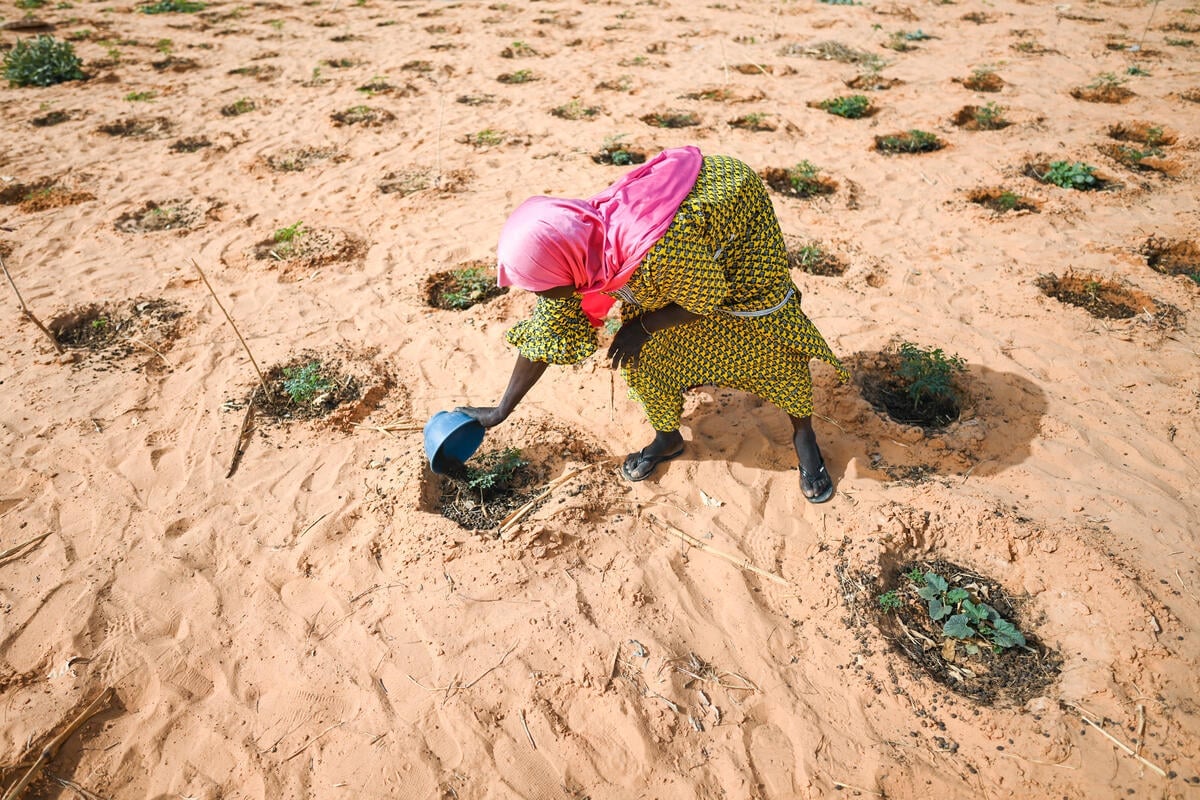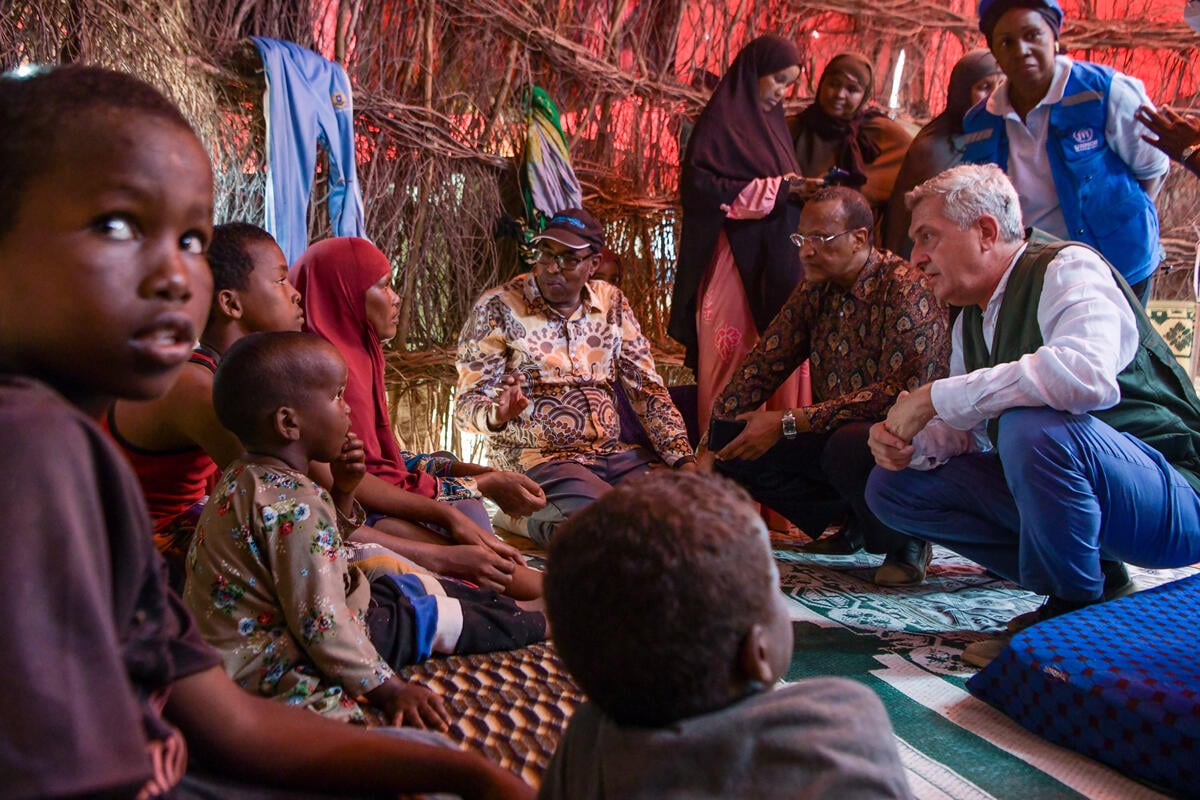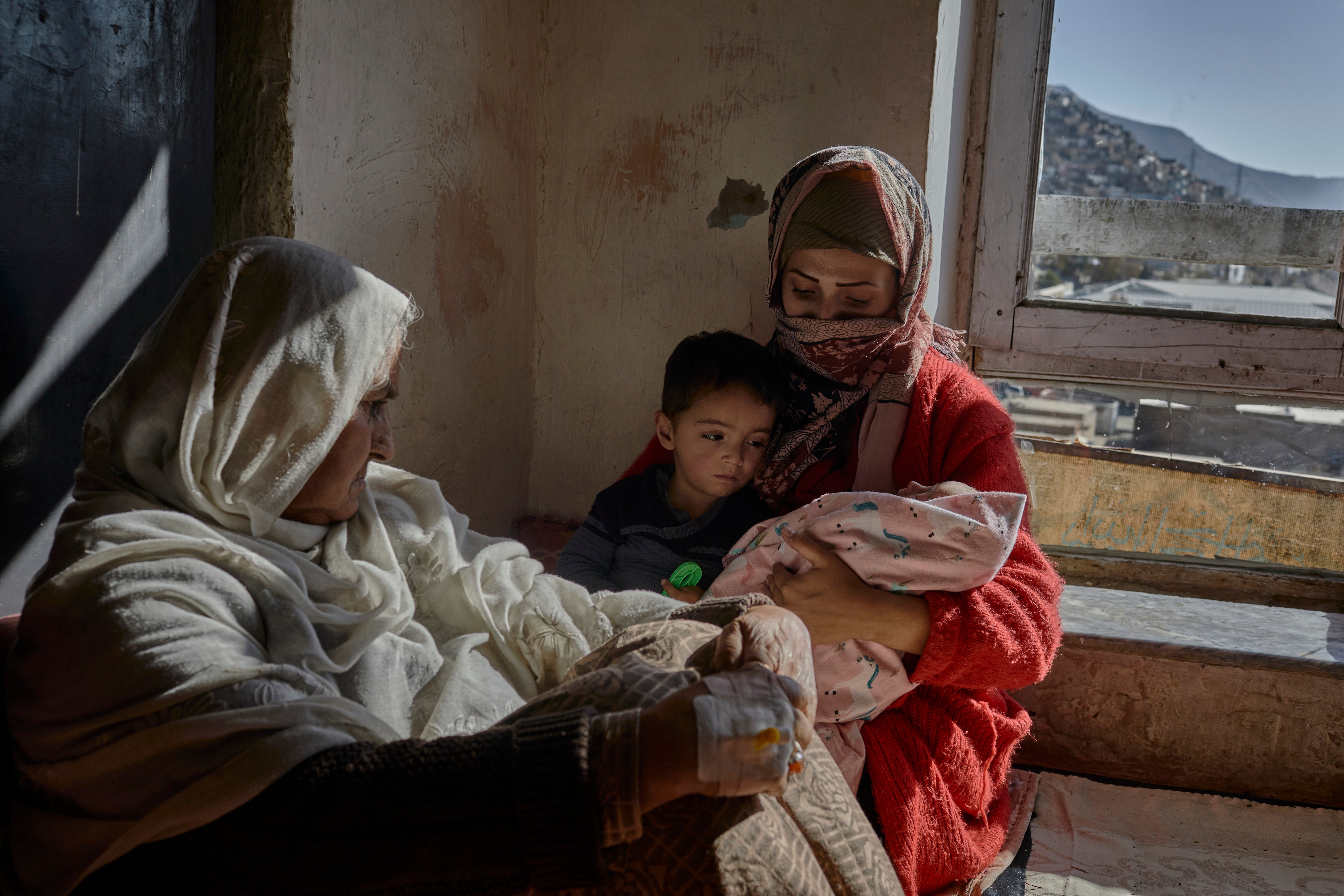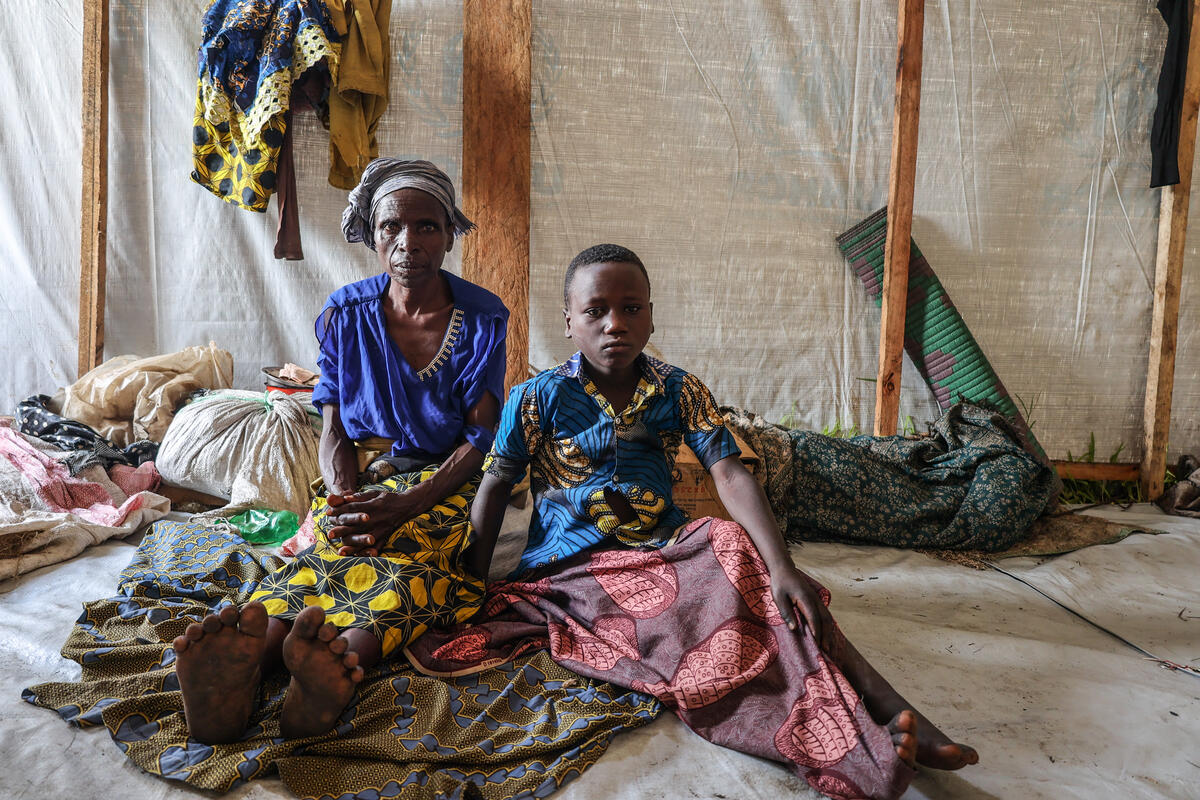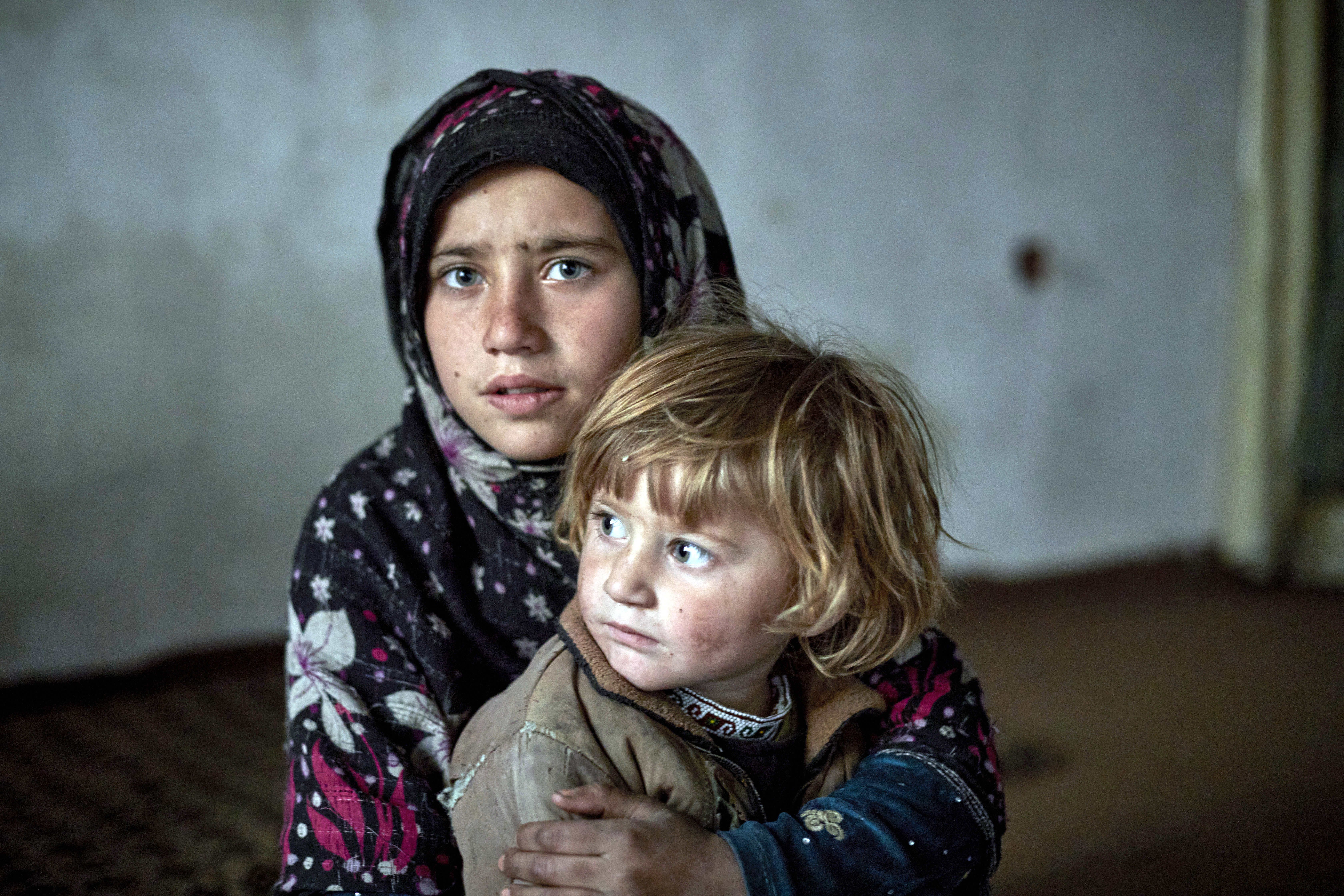Feature: "They are not only attacking us, they are attacking the whole of humanity," say Colombia's indigenous people
Feature: "They are not only attacking us, they are attacking the whole of humanity," say Colombia's indigenous people

BOGOTA, Colombia (UNHCR) - At the checkpoint, a long line of trucks waits to be inspected by soldiers of the Colombian army. A small aircraft returning from spraying illegal coca fields lands in an airstrip heavily fortified with razor wire and guarded by several machine-gun nests and sand bag barricades.
The southern province (department) of Putumayo is known as one of the main areas of coca production in Colombia. Coca leaves are processed in clandestine laboratories deep in the Amazon rainforest to make coca paste, which is then refined into cocaine and smuggled out of the country. The control of this profitable illegal trade is hotly disputed by various irregular armed groups and organised crime syndicates. This has made Putumayo one of the most violent places in Colombia. According to official statistics, the murder rate in municipalities such as Puerto Asís and Valle del Guamuez is among the highest in the country.
Several villages along the road that links Puerto Asís, where the UN refugee agency has a field office, and Mocoa, the departmental capital, are still half-empty as most of their inhabitants fled to the cities in recent months to escape the conflict between left-wing guerrillas and right-wing paramilitaries. Few of these internally displaced persons (IDPs) have returned to their homes.
The four-decade internal conflict in Colombia has left an estimated 2 million people displaced. As in the rest of the country, the indigenous communities of Putumayo have been affected by the presence and activities of irregular armed groups in their territories.
"Unfortunately for us, our territories are considered by the armed actors to be of great strategic importance," says an indigenous leader from Putumayo who, as is very often the case in Colombia, requested not to be named for his own security. "Both the guerrillas and the paramilitaries have attempted to recruit indigenous youth by persuasion or force. They have also killed many members of our communities. Last year they killed 69 indigenous people in Putumayo, this year so far they have killed more than 15. In the last two months at least 50 indigenous families from Puerto Guzmán, Villa Garzón and Puerto Leguízamo were displaced."
Forced displacement is a tragedy for everyone affected. But for indigenous people, because of their ties to their territory, it means cultural loss and the eventual disappearance of their way of life.
"For us the land is the most important thing of all," declares the Life Plan of the Cofán People, an ethnic group that lives in the border areas between Ecuador and Colombia. "If we lose our territory we disappear as a culture, as a community, we lose our children, we lose everything, we become poor, we become sad. We remain only as drifters, we are here today and tomorrow we disappear."
"Indigenous government is based on a delicate balance of alliances between clans and families," explained a leading official of the National Indigenous Organisation of Colombia (ONIC). "The displacement of one family can alter the whole internal structure of a community. The displacement of a community can alter the whole universe. In the cosmogony of the peoples of the Sierra Nevada de Santa Marta, for example, the Sierra rests on four pillars, one belonging to each of the main ethnic groups. If one group is displaced, as is happening with the Kankuamos right now, the spiritual and physical universe of all the groups that inhabit the Sierra will suffer."

The situation of indigenous people all over Colombia is a source of grave concern. According to ONIC, practically all the indigenous communities in the country have suffered or are at risk of suffering forced displacement and serious human rights violations. Those communities that have managed to cling to their territory remain extremely vulnerable.
ONIC, with the support of UNHCR, closely monitors the situation of all the indigenous groups in Colombia. The case of the Kankuamos is particularly critical. According to ONIC, more than 1,500 people, or a third of the entire population of 4,500 people, were forcibly displaced last year. Other indigenous groups from the Sierra Nevada de Santa Marta, from the Naya region, as well as the Sikwani (Guahibo), the Tule (Kuna), the Bari, and the Embera have also been seriously affected by the conflict.
In Mocoa, a pleasant city in the foothills of the Andes, an organisation representing 36,000 people from 128 communities and 12 different ethnic groups is working to defend the rights of the indigenous peoples of Putumayo. The Indigenous Zonal Organisation of Putumayo (OZIP) has productive projects implemented by non-governmental organisations that benefit indigenous communities. It also provides information, practical help, legal advice and training to individuals and communities, helps to strengthen the indigenous local authorities ("cabildos") and carries out education and research into indigenous cultures and legal systems.
UNHCR provides OZIP with financial support to carry out its activities. "We don't see UNHCR's support only in terms of money but in terms of trust," said an official of the organisation. "UNHCR is one of the first organisations that trusted us to administer our own resources. This is very important for any organisation. We learnt to administer budgets and financial resources and that has given us the capacity to negotiate other agreements, such as the one with the Colombian government that compensated indigenous communities for the voluntary substitution of 6,000 hectares of coca."
OZIP also provides culturally-appropriate psychosocial support to indigenous IDPs who have experienced psychological trauma. "We refer them to specialists, according to their culture," explains an OZIP member. "Some indigenous doctors practise cures with coca leaves. Others use the yagé (a vine that is seen as a cohesive spiritual element in many indigenous cultures in the region)." Supported by an organisation such as OZIP that understands and shares their own culture, indigenous IDPs are better prepared to cope with the difficulties of living in a strange and often hostile environment.
Another way in which UNHCR is helping to protect populations at risk, including indigenous people, is through its support for the work of the National Registry Office. The national identification document, known in Colombia as "cédula", is vital in order for anyone to claim their rights or receive assistance. Many indigenous people in Colombia do not have any documents. "Long time ago, the only cédula was this," a Cofán traditional leader said, pointing at his many brightly-coloured necklaces. "This was all we needed to be identified by others."

Lack of documentation exposes indigenous people to human rights violations by the different groups taking part in the armed conflict and hinders the effective exercise of their rights as citizens. "Without a cédula, you simply don't exist," an indigenous leader explained. "We need to have documents for our security, in order to adapt to the needs of society and to receive basic health, education and other services from the government. Without documents we can't even register our dead."
All over Colombia, documentation campaigns supported by UNHCR have resulted in some 140,000 identification documents being issued to internally displaced persons, persons at risk of displacement or persons belonging to communities that receive IDPs.
Many of these campaigns have benefited indigenous communities. In the locality of La Hormiga, in the Lower Putumayo, for example, UNHCR and the National Registry Office worked closely with the Permanent Working Board of the Association of Traditional Authorities of the Cofán People, to organise a documentation campaign. The campaign lasted three days and provided identification documents to 289 indigenous people.
A member of the Permanent Working Board, which represents not only the Cofáns but also the Awá, the Nasas (also known as Paes), the Quichwas, the Pastos and the Embera-Chamí peoples, explained their philosophy: "We always maintain the respect for our Elders, the traditional authorities. This is what makes us different from other organisations. Our Elders are a living library, a source of knowledge about Nature, the appropriate use of the land and its resources and the ways people should live and behave. Through the medicine (yagé) they see if something is appropriate and they plan how to do it. When UNHCR proposed this campaign, the Elders and the traditional leaders met to analyse and decide if it was convenient. They decided that it was and we accepted."
According to the representative, "in the indigenous world vision there is no place for greed or the accumulation of material things. We only aspire to live in harmony with Nature."
In fact, indigenous people all over Colombia share this view. They see themselves as custodians of Nature, entrusted with its protection on behalf of future generations: "Colombia is the most bio-diverse country in the world and 75 percent of its biodiversity is to be found in the territories of indigenous peoples," an indigenous leader from the Naya region said in Bogota. "When they attack us, they are not only attacking us, they are attacking the whole of humanity."
By William Spindler
UNHCR Bogota


